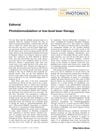4 citations,
October 2018 in “Skin appendage disorders” Co-washing is gentler on hair but can cause residue buildup.
 13 citations,
September 2022 in “Materials & design”
13 citations,
September 2022 in “Materials & design” The new patch for treating mouth sores releases medicine slowly, sticks well, and helps healing without the side effects of current creams.
 128 citations,
September 2011 in “British Journal of Dermatology”
128 citations,
September 2011 in “British Journal of Dermatology” Obesity is linked to various skin problems and may increase the risk of skin cancer.
 74 citations,
July 2008 in “Journal of Dermatological Case Reports”
74 citations,
July 2008 in “Journal of Dermatological Case Reports” Trichoscopy is a quick and easy way to diagnose most genetic hair problems without invasive methods.
 162 citations,
January 2015 in “Trends in Endocrinology and Metabolism”
162 citations,
January 2015 in “Trends in Endocrinology and Metabolism” Women with PCOS face higher risks of diabetes and heart disease, and these risks increase with obesity.
 2 citations,
October 2016
2 citations,
October 2016 Chemotherapy and radiotherapy can cause skin side effects like rashes, hair loss, and nail changes, which are usually managed with conservative treatments.
February 2023 in “European biophysics journal”  8 citations,
January 2003 in “Pharmacotherapy: The Journal of Human Pharmacology and Drug Therapy”
8 citations,
January 2003 in “Pharmacotherapy: The Journal of Human Pharmacology and Drug Therapy” Chemotherapy may cause recurring hair loss due to an autoimmune response.
 1 citations,
April 2019 in “Endokrynologia Polska”
1 citations,
April 2019 in “Endokrynologia Polska” Healthy diet and exercise are important for women with PCOS to manage weight and metabolic issues, and supplements like omega-3, vitamin D, and inositol may help.
 140 citations,
August 2011 in “Biomaterials”
140 citations,
August 2011 in “Biomaterials” Keratose, derived from human hair, is a non-toxic biomaterial good for tissue regeneration and integrates well with body tissues.
 2 citations,
June 2021 in “Research Square (Research Square)”
2 citations,
June 2021 in “Research Square (Research Square)” A new gene mutation causes long hair in some Maine Coon cats.
February 2025 in “Infectious Diseases & Immunity” HHV-6 reactivation may be linked to psychiatric disorders and can improve with antiviral treatment.
10 citations,
February 2022 in “Pharmaceuticals” Smaller curcumin nanocrystals penetrate skin and hair follicles better than larger ones.
 19 citations,
January 2018 in “Acta dermato-venereologica”
19 citations,
January 2018 in “Acta dermato-venereologica” People with alopecia areata have higher levels of a heart disease marker than those without hair loss.
 12 citations,
July 2016 in “Forensic science international”
12 citations,
July 2016 in “Forensic science international” The research found that postmortem root bands in hair are likely caused by the breakdown of a specific part of the hair's inner structure after death.
 48 citations,
February 2013 in “Molecular and Cellular Endocrinology”
48 citations,
February 2013 in “Molecular and Cellular Endocrinology” The protein StAR is found in 17 different organs and can affect hair loss and brain functions, but its full role is not yet fully understood.
 20 citations,
October 2018 in “American Journal of Clinical Dermatology”
20 citations,
October 2018 in “American Journal of Clinical Dermatology” Some drugs can cause skin and hair color changes, often reversible when the drug is stopped.
5 citations,
April 2023 in “Pharmaceuticals” The new delivery system improved hair growth in alopecia treatment.
 160 citations,
December 2016 in “Journal of biophotonics”
160 citations,
December 2016 in “Journal of biophotonics” Low-level laser therapy, now called photobiomodulation, is recognized for its broad medical applications and scientific backing.
 42 citations,
January 2017 in “Genes”
42 citations,
January 2017 in “Genes” The gene KAP22-1 affects wool yield and fiber shape in sheep.
 3 citations,
November 2015 in “Endocrinology, Diabetes & Metabolism Case Reports”
3 citations,
November 2015 in “Endocrinology, Diabetes & Metabolism Case Reports” Ring Chromosome 11 may be linked to conditions like early puberty, excessive hair growth, hair loss, and type 2 diabetes.
 14 citations,
January 2008 in “Medical mycology”
14 citations,
January 2008 in “Medical mycology” Canadian porcupines in a Japanese zoo passed a skin fungus to each other.
 2 citations,
February 2009 in “Journal of the American Academy of Dermatology”
2 citations,
February 2009 in “Journal of the American Academy of Dermatology” Injecting triamcinolone into the eyebrow area may help eyelash regrowth in alopecia areata patients.
 64 citations,
August 1999 in “The American journal of medicine”
64 citations,
August 1999 in “The American journal of medicine” The transscrotal testosterone patch normalizes hormone levels in men with AIDS and weight loss but does not improve weight, body mass, or quality of life.
 16 citations,
October 2023 in “Molecular cancer”
16 citations,
October 2023 in “Molecular cancer” New treatments like nanotechnology show promise in improving skin cancer therapy.
 1 citations,
May 2023 in “European Journal of Human Genetics”
1 citations,
May 2023 in “European Journal of Human Genetics” Rare ULBP3 gene changes may raise the risk of Alopecia areata, a certain FAS gene deletion could cause a dysfunctional protein in an immune disorder, and having one copy of a specific genetic deletion is okay, but two copies cause sickle cell disease.
4 citations,
January 2020 in “Genes” The KRTAP21-2 gene affects wool length and quality in sheep.
 4 citations,
January 2022 in “Yonsei Medical Journal”
4 citations,
January 2022 in “Yonsei Medical Journal” Microneedles are a promising method for drug delivery, offering efficient and convenient alternatives with fewer side effects.
1 citations,
August 2024 in “Animals” KRT85 gene variations can help improve wool traits in sheep through selective breeding.
 May 2022 in “Indian Journal of Animal Research”
May 2022 in “Indian Journal of Animal Research” Melatonin receptor genes likely play an important role in the development of goose feather follicles.






















